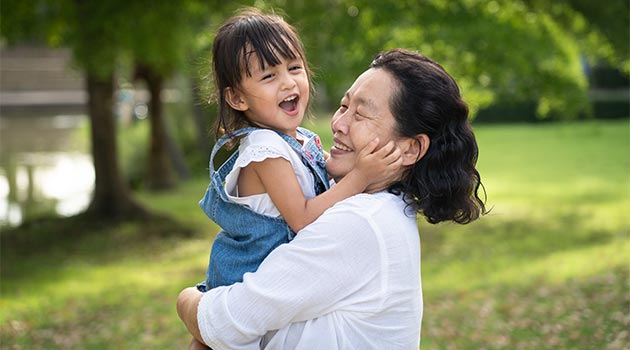What gives you a warm feeling? 🥰

What are grandparents' rights?

When family relationships breakdown, it's often the grandchildren and grandparents who suffer a separation through no wish of their own. It's not an uncommon situation - our recent survey revealed that 14% of our users are estranged from their grandchildren. With so much conflict and emotional distress to deal with, it's often difficult to know where to start with making contact, so here's our guide to grandparents' rights in the UK.
Get grandparenting advice and more straight to your inbox...
What rights do grandparents have? | Enforcing grandparents' rights | Contact rights after a divorce | What to do if you're denied contact | Negotiating with parents | Paternal grandparents | Reaching an agreement | Indirect contact | Legal costs | False accusations | Death of a parent | Adoption or fostering | What to do in the meantime
What rights do grandparents have?
Do grandparents have rights? Do they have a right to see their grandchildren by virtue of being closely related? The short answer to this is, no - grandparents do not have any automatic legal rights. You can, however, apply for rights to see your grandchildren under the 1989 Children's Act, providing you have leave from the courts to do so. David Vavrecka, a barrister at Coram Chambers, told Gransnet: "It's true that grandparents have no rights over and above anyone else. However, the court will take account of the connection and blood tie, and this will be an important factor when the court comes to consider whether it is in the child's best interests to order contact."
How to enforce your rights as a grandparent
You may wish to apply for a court order, depending on your situation, which will give you the right to preside over the care of your grandchild, but it is advised that you seek legal advice as soon as possible and think this over carefully (see below on reaching an agreement). There are a number of different legal orders including:
- Special Guardianship Order - the court will appoint you as a the 'Special Guardian' of your grandchild until they turn 18.
- Child Arrangement Order - the court will decide where the child should live.
- Kinship foster care - when you become an official foster carer for a child.
- Adoption - this will break the link between your grandchild and their birth parents. You will legally become your grandchild's parent.
Enforcing contact and other legal orders can be a tricky business, but family law courts have several systems in place to make sure they are upheld, including imposition of parenting courses or unpaid work. In extreme cases, parents will even be imprisoned for breaking contact orders.
You may also be entitled to some financial support depending on your legal order and your local authority, but it is advisable that you seek legal advice or consult your local authority before obtaining a legal order.
Despite the fact that there are no automatic rights to see your grandchild, your position as a blood relative will be something that is taken into account as the court ultimately decides the outcome of the case.
The lack of grandparents' rights was discussed by Parliament in May 2018. Both Labour and Conservative MPs said that stories of grandparents' estrangement from their grandchildren was 'heartbreaking'. They called for an amendment to the Children Act, which would give children the right to have a relationship with their extended family members if passed.
However, although the importance of extended family in a child's life has been acknowledged, it has been recommended that Child Arrangement Orders stay in place to "prevent hopeless or vexatious applications that are not in the interests of the child".
Contact rights after a divorce
Grandparents' rights to maintain contact with their grandchildren after divorce and family breakdown is often a difficult issue. You're an important person to the children and someone who can help them maintain some stability at this difficult time. You're also less likely to be in the thick of things, especially when it comes to feuding parents.
It's important to take the opportunity to be involved if it arises, especially if you're worried about what will happen later. Involvement now may make a difference to the amount of contact you have after the separation. There is, of course, always the danger that you'll be asked to do more than you're prepared for. You're quite entitled not to want to take on more unpaid childcare than you feel comfortable with. But if you choose not to be involved at the time of separation, you might find what you want isn't taken seriously when the family is reorganised in the light of the divorce.
What to do if you're denied contact
If one or both of the parents are refusing to allow you contact with your grandchild, there are several ways to explain your case for emotional support:
- Show them that you miss your grandchild and that they will miss you.
- Explain the emotional and practical support you're offering, and show how useful that could be to the parents.
- Suggest that the child is consulted on how they feel about the contact arrangements (especially if you think the outcome will be positive).
- Remind them of the importance of grandparents in a child's understanding of their sense of self, personal identity and culture.
- Stress that genetic origin can be important to a child as they grow older, and denying the child contact with half of that origin could be upsetting or even confusing for the child.

Negotiating with the parents
Custody is generally granted to the mother, so maternal grandparents usually end up being the providers of more of the emotional and financial support following a divorce. If you're uncomfortable with what you're being asked to do, talk it through as soon as possible with the parents. Remember, they may be agreeing contact arrangements between themselves, so this is the time for you to ask for your rights as a grandparent to be taken into account. Ask to be added to the contact agreement, so that you have a clear point of reference. Do it face-to-face in order to avoid any confusion.
Do paternal grandparents lose out?
Paternal grandparents are treated in the same manner as maternal ones in the eyes of the law. However, it is worth checking whether your son has parental responsibility, which is obtained by marriage or his name on the child's birth certificate.
Paternal grandparents may find themselves negotiating contact with the child's mother, to whom they will no longer be related. This can be a tricky situation - but there's research showing that where paternal grandparents support contact, sons are much more likely to stay in touch with their children after divorce, so involvement is more important now than ever.
Reaching an agreement
If informal communications aren't working, you might want to suggest accompanying the parents for mediation, where an independent person helps you to reach an agreement about the child's care. To get a mediation, you'll need both parents to agree to join you.

If neither informal discussion nor mediation works, you can currently apply for a court application for permission to apply to see your grandchild. Going to court is disruptive to the family dynamic, can take emotional toll on all involved and can cause relations to get worse, so it's good news that the government is in the process of changing the legal position. In the past, the assumption was that grandparents had to ask for access to grandchildren; now it's that grandparents automatically have authority.
The onus will be on the parents to honour the relationships that matter to the child, meaning that arrangements for contact with grandparents will now have to be part of parenting agreements that are drawn up at the time of divorce - and it's only when these break down that the courts will get involved. The government stopped short of enshrining grandparents rights in the UK to see their grandchildren in law, but the balance has definitely tipped in recent years.
Get our latest threads delivered straight to your inbox...
Indirect contact
If you've been denied contact with your grandchild after going to the courts for access, you can still contact them indirectly - by writing, emailing or phoning them.
If the parents have refused you contact, it's sensible to tell them you intend to contact your grandchild in this way. Keep the relationship open and make sure the child isn't forced to keep secrets on your behalf. Remind the parents how useful you can be, and of your role in keeping the child in touch with other family members or members of their extended family. And remember - your grandchild's awareness that you want to be in touch and that the relationship matters to you can be a big boost for their self-esteem at such a tough time.
What is the cost of applying for rights to see your grandchildren?
Of course, it's preferable to come to an informal agreement outside of court, but this isn't always possible and the courts are a last resort. It's worth being prepared though. Legal costs are often substantial, and can reach up to £2,000 in the run-up to a court hearing. Further costs will be incurred thereafter.
Many barristers will now see their clients directly (direct access) to give them legal advice, so it's worth considering this as well.
How to deal with false allegations when fighting for rights
It is possible for the person falsely accused, if they are not a party, to become a witness and be called to court to give evidence, which will enable the court to decide the truth of the allegation. In some cases, you can apply to become an intervenor, which allows you to see the papers in the case, and to be represented at the hearing which is investigating serious allegations.
Grandparents' rights after the death of a parent

A child in this situation would not automatically go to the grandparents. It's important that a guardian is nominated in the parents' wills to avoid any confusion on that score and ensure that the correct person takes on parental responsibility according to the parents' wishes.
If a grandparent is named as the legal guardian of a child in the event of the parents' death, they would be expected to take him/her on. If no guardian is nominated, the immediate family make the arrangements. If any disputes arise on the subject of guardianship, the courts will then be asked to resolve this.
Courts will consider what is in the best interests of the child, first and foremost, and, for the most part, that will be placing the child with their grandparents - especially when the alternative is foster care.
Grandparents' rights after adoption or fostering
If your grandchild has been taken into care, the Local Authority must encourage family contact unless it goes against your grandchild's welfare. From an early stage, it is important that you are in contact with the Children's Service department (responsible for your grandchild's care under a care order) to make sure that they know who you are and that you wish to remain in communication with your grandchild. You can remind the local authority of the right to family life under Article 8 of the European Convention on Human Rights.
If you had parental responsibility before your grandchild was taken into care, the local authority must allow contact to exist, unless they obtain an order stating otherwise. Grandparents without parental responsibility who are refused contact must apply for a Child Arrangements Order.
Contact with your grandchild's guardian is also vital. Once this happens, Children's Services can arrange regular meetings and create a care plan for your grandchild, centred around who they want to see. A child's parents retain parental responsibility if fostering is part of a voluntary arrangement with the local authority, which means that the parents can decide who their child can and cannot see.
Even though you, as a grandparent, have no automatic rights when it comes to legal guardianship, you can apply for a Residence Order or a Special Guardianship Order (as above) if you are concerned about the welfare of your grandchild after they've been fostered or adopted.
What can you do in the meantime?
"Collect cards and little presents for your grandchild, and keep them in a box until you can see them again."
Your patience will be severely tested during this time, but some grandparents in this position have said that remaining calm, but available, has sometimes been the best course of action while the dust settles and tempers cool down. Many suggest sending birthday cards or keeping them (and any birthday gifts) in a collection box so you can show them to your grandchild when contact is restored, demonstrating how you never stopped thinking about them.
You can find more information on the Relate website. You can also get support from others in your situation on the Gransnet forums where you can talk to others who are in a similar situation and further advice here on how to cope with estrangement.


